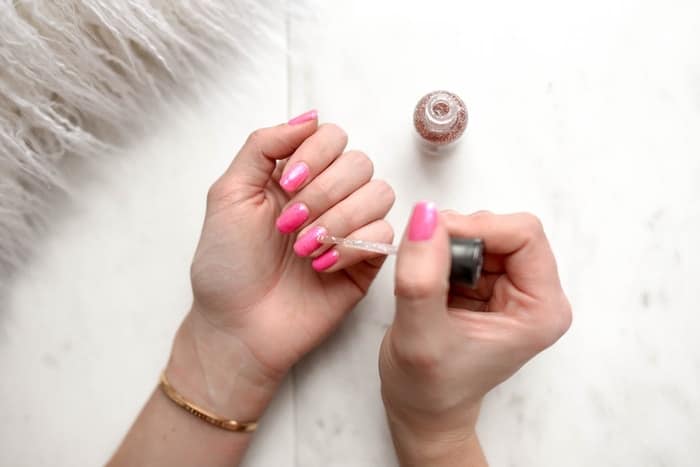Your nails need all the care and love they deserve. But when it comes to pampering your nails, what should you use between a nail hardener and a nail strengthener. A nail hardener offers a thick layer of protection for your nails to help prevent damage or breakage. Meanwhile, a nail strengthener helps improve nail health over time.

Read on below to know more about nail hardeners and strengtheners to determine the right product to use for your precious nails.
What is a Nail Hardener?
A nail hardener is a type of clear and thick lacquer that dries down into a resistant protective layer. This product helps prevent not just chipping on the edge but also nail breakage in general. It means that if your goal is to grow your nails beautifully, a nail hardener is the best product you can count on to help you achieve your goal.
But there are a few things you need to know about nail hardeners before you decide to include them in your routine.
Two Types of Nail Hardeners
There are two types of nail hardeners that you can find in the market today and these are reinforcing hardeners and cross-linking hardeners.
Reinforcing Hardeners
Reinforcing hardeners work on the outer portion of your nail instead of the inner part. To put it simply, reinforcing hardeners add a hard protective layer on top of your own nail with no need to change the actual nail below. A reinforcing hardener achieves it with the use of several ingredients including sulfhydryl protein and nylon.
Reinforcing hardeners are almost the same as base coats as they work to form a protective coat on top of your nails for them to feel more rigid than before.

Cross-Linking Hardeners
To get a good understanding of how cross-linking hardeners work, try to imagine your nail as a ladder. If your nails are brittle, the rungs on the ladder are unstable, wobbly, and weak. But once you add a cross-linking hardener, it is like you will get extra rungs that will support the ladder. A cross-linking hardener can work directly with your nails’ protein using ingredients such as calcium and formaldehyde.
Cross-linking hardeners tightly bind the keratin protein present in your nails for your nail plates to become harder and less flexible. These products do the trick for you to grow strong and long nails.
These two types of nail hardeners can both provide the protection that your nail plates need.
The Good and Bad Side of Nail Hardeners
Nail hardeners are easy to include in your routine. This acts just like a base coat. The only thing you need to do is apply a single coat over your nails and allow them to dry. Once it hardens, it will give off a resilient and shiny finish.
However, even though nail hardeners can help your nails grow much longer than they often would, these products have a few downsides. For instance, regular use of nail hardeners will lead to inelastic and brittle nails that are more prone to breakage.
It is also important to note that there are nail hardeners that contain dangerous ingredients. One of these is formaldehyde which can cause damage to the nails after some time. This ingredient can also cause breaking or lifting, particularly if you use the product often. The good news is that there are other options available that use safer ingredients.
If you ever need to use a product that contains formaldehyde, it is a must that you do it sparingly. Similar to other dangerous products, using a nail hardener that contains formaldehyde now and then won’t likely cause any damage. This means you should avoid frequent use of it.
You might think that you can protect your hard nails from cracking. However, it is exactly the opposite case. In the case of cross-linking hardeners, your nails can turn too hard to the point that they can no longer bend, increasing their chances of snapping. As for reinforcing hardener, you might have trouble with the need for constant reapplication just to guarantee proper protection.
This means that if you want to repair your weak nails or you wish to grow them strong and long, a nail hardener may be a great tool to use. But these don’t come with risk. Make sure you conduct a patch test first and use the product as indicated on the label so you can say hello to longer nails.

What is a Nail Strengthener?
Aside from cuticle oils, nail files, and buffers, a nail strengthener plays a crucial role when it comes to nail maintenance and nail care. These products nourish the nail plate and improve the overall wear resistance and strength of nails.
Nail strengtheners improve the natural nail plate’s condition by providing nourishment and protection to the nails. The strengthener acts as a flexible protective film that can reinforce the nail’s structure and at the same time, impart nutrients and vitamins to the nail plate to encourage growth.
Naturally healthy and strong nails contain keratin, a type of keratin that makes them durable and tough. On the other hand, fragile, soft, or weak nails don’t have keratin content and can benefit from the use of nail strengtheners.
Chemical Composition of Nail Strengtheners
Nail strengtheners have several different types, and they all have different formulations. The chemical composition of every strengthener can help determine the ability of the ingredients for successful penetration of the nail bed.
The best type of nail strengtheners also features a composition that includes a nourishment delivery system. Most formulations of nail strengtheners include plasticizers and solvents such as tosylamide formaldehyde resin, nitrocellulose, butyl acetate, and ethyl acetate. Most of the ingredients used for reinforcing nails tend to wear off fast, which requires their frequent reapplication for them to be effective.
What to Use Between Nail Hardener and Nail Strengthener?
If you are still confused about what to use between these two, you will be better off using a nail strengthener if your nails are dry and tend to peel easily. The only downside is that it may take some time before improvement occurs.
Meanwhile, a nail hardener is specially made for nails prone to splitting. But excessive use of it may make your nails really hard, leading to more breakage.
Always weigh the pros and cons of these two to choose the right product for you!

